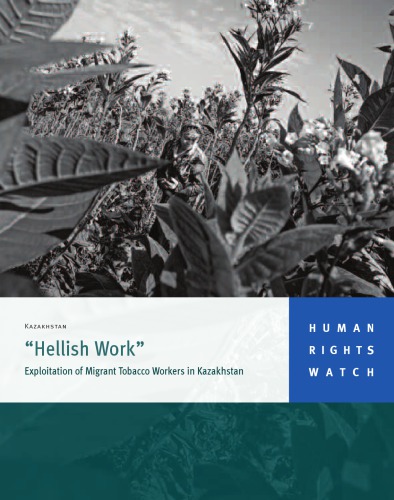Product desciption
Hellish Work The Exploitation Of Migrant Tobacco Workers In Kazakhstan Buchanan by Buchanan, Jane 9781564326560, 156432656X instant download after payment.
"Thousands of migrant workers from Kyrgyzstan, often together with their children, travel to Kazakhstan each year. Many find work in tobacco farming. Human Rights Watch research in 2009 documented abuse and exploitation of many migrant workers by tobacco farm owners who employ them for seasonal work. Tobacco farm owners in Kazakhstan contract with and supply tobacco to Philip Morris Kazakhstan (PMK), a subsidiary of Philip Morris International (PMI), one of the world's largest tobacco companies. Migrant workers variously told Human Rights Watch how some employers confiscated their passports, failed to provide them with written employment contracts, did not pay regular wages, cheated them of earnings, and forced them to work excessively long hours. In the worst cases, workers were subjected to forced labor, or situations analogous to forced labor, in which employers confiscated migrant workers' passports and in some cases required them to perform other work without pay or compensation in addition to tobacco farming. Human Rights Watch documented 72 cases of children working in tobacco farming in 2009. Owing to the difficulty of the work and the risks associated with handling of tobacco leaves and exposure to pesticides, experts agree that tobacco farming is one of the worst forms of child labor, or labor from which children under 18 are categorically prohibited. Children who work with their families on tobacco farms typically miss several months of school each year, or even entire academic years. The government should ensure rigorous labor inspections, prosecution of abusive employers, and develop accessible complaint mechanisms for victims and timely and effective investigations into allegations of abuse. PMI and its subsidiaries should ensure fulfillment of commitments made in 2010 in response to Human Rights Watch's concerns. These commitments include requiring employers in its supply chain provide written contracts, establish regular wages for workers, stop the use of child labor."--Page 4 of cover.
Abstract: "Thousands of migrant workers from Kyrgyzstan, often together with their children, travel to Kazakhstan each year. Many find work in tobacco farming. Human Rights Watch research in 2009 documented abuse and exploitation of many migrant workers by tobacco farm owners who employ them for seasonal work. Tobacco farm owners in Kazakhstan contract with and supply tobacco to Philip Morris Kazakhstan (PMK), a subsidiary of Philip Morris International (PMI), one of the world's largest tobacco companies. Migrant workers variously told Human Rights Watch how some employers confiscated their passports, failed to provide them with written employment contracts, did not pay regular wages, cheated them of earnings, and forced them to work excessively long hours. In the worst cases, workers were subjected to forced labor, or situations analogous to forced labor, in which employers confiscated migrant workers' passports and in some cases required them to perform other work without pay or compensation in addition to tobacco farming. Human Rights Watch documented 72 cases of children working in tobacco farming in 2009. Owing to the difficulty of the work and the risks associated with handling of tobacco leaves and exposure to pesticides, experts agree that tobacco farming is one of the worst forms of child labor, or labor from which children under 18 are categorically prohibited. Children who work with their families on tobacco farms typically miss several months of school each year, or even entire academic years. The government should ensure rigorous labor inspections, prosecution of abusive employers, and develop accessible complaint mechanisms for victims and timely and effective investigations into allegations of abuse. PMI and its subsidiaries should ensure fulfillment of commitments made in 2010 in response to Human Rights Watch's concerns. These commitments include requiring employers in its supply chain provide written contracts, establish regular wages for workers, stop the use of child labor."--Page 4 of cover


